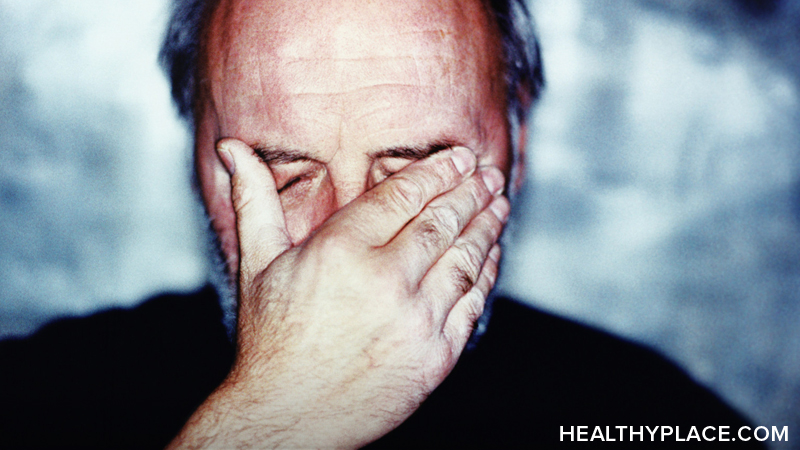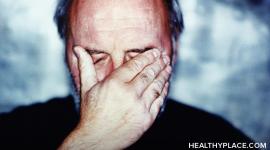Depression in Men: Understanding Male Depression

Depression is an illness that affects both men and women. But people working in mental health services see far fewer men with depression. It seems likely men suffer from depression just as often as women, but they are less likely to ask for help. Male depression is treatable and best treated as early as possible. Men need to know answers to: what is depression and how to get effective help.
Depression in Men is Different
Men think of themselves differently than women and this can be quite unhelpful. Compared with women, they tend to be far more concerned with being competitive, powerful and successful. Most men don't like to admit they feel fragile or vulnerable, and so are less likely to talk about their feelings with their friends, loved ones or their doctors. This may be the reason depressed men often don't ask for help. Men tend to feel they should rely only on themselves and it is somehow weak to have to depend on someone else, even for a short time.
This traditional view of how men should be - always tough and self-reliant - is also held by some women. Some depressed men actually find their partner rejects them because of their depression. Even professionals sometimes share this view, and may not diagnose depression in men when they should.
Symptoms of Depression in Men
- Feeling sad or unhappy
- High levels of anxiety
- Low energy
- Difficulties concentrating
- Feeling worthless or hopeless
- Losing interest in activities or people
- Weight loss
- Loss of appetite
- Loss of sex drive
- Lapses in personal hygiene, such as not bathing or shaving as regularly
- Thoughts of suicide
The symptoms for some types of male depression may also include extreme opposites of those listed above; for example, unusually high or prolonged levels of energy, significant weight gain and so on.
Other people may notice:
- You are performing less well at work
- You seem unusually quiet, unable to talk about things
- You're worrying about things more than usual
- You're more irritable than usual
- You're complaining more about vague physical problems
Read more comprehensive information about male depression symptoms.
How Depressed Men Cope
Instead of talking about how they feel, depressed men may try to make themselves feel better by using alcohol or drugs. This will usually make things worse in the long run. Their work will suffer and alcohol often leads to irresponsible, unpleasant or dangerous behavior. Men with depression also tend to give their work a higher priority than their home life, which produces conflicts with their wives or partners. All of these things have been shown to make depression more likely.
Depressed Men and Relationships
For married men, research has shown trouble in a marriage is the single most common problem connected with depression. Depressed men can't cope with disagreements as well as women. Arguments actually make men feel very physically uncomfortable. So, they try to avoid arguments or difficult discussions. Depression in men often leads to the situation where a man's partner will want to talk about a problem, but he will not and will do his best to avoid talking about it. The partner feels they are being ignored and tries to talk about it more, which makes the depressed man feel he is being nagged. So, he withdraws even more, which makes his partner feel even more that they are being ignored . . . and so on. This vicious circle in male depression can quite easily destroy a relationship.
Male Depression and Separation / Divorce
Men have traditionally seen themselves as being the leaders in their family lives. However, the process of separation and divorce is most often started by women. Of all men, those who are divorced are most likely to kill themselves, probably because depression is more common and more severe in this group. This may be because, as well as losing their main relationship, depressed men often lose touch with their children, may have to move to live in a different place, and often find themselves hard-up for money. These are stressful events in themselves, quite apart from the stress of the break-up, and are likely to bring on male depression.
Depressed Men and Sex
Depressed men feel less good about their bodies and less sexy than when they're not depressed. Many just go off sex completely. Several recent studies suggest that, in spite of this, men who are depressed have intercourse just as often, but they don't feel as satisfied as usual. A few depressed men actually report increased sexual drive and intercourse, possibly as a way of trying to make themselves feel better. Another problem in male depression may be that some antidepressant drugs reduce sex-drive in a small number of men who take them.1
However, the good news is that, as the depression improves, so will your sexual desire, performance and satisfaction.
It's worth remembering that it can happen the other way round. Impotence (difficulty in getting or keeping an erection) can be a cause of depression in men. Again, this is a problem for which it is usually possible to find effective help.
Pregnancy and Children and Depression in Men
We have known for many years some mothers feel severely depressed after having a child. It is only recently we have realized more than 1 in 10 men also suffer depression during this time. This shouldn't really be surprising. We know that major events in people's lives, even good ones like moving house, can bring about a period of depression in men and women. And this particular event changes your life more than any other. Suddenly, you have to spend much more of your time looking after your partner, and the children.
On an intimate level, new mothers tend to be less interested in sex for a number of months. Simple tiredness is the main problem, although men may take it personally and feel they are being rejected. Men may have to adjust, perhaps for the first time, to taking second place in your partner's affections. Men also find they have to spend less time at work. Paternity leave is still quite unusual in most parts of the world.
Depression in new fathers is more common if their partner is depressed, if they aren't getting along with their partner, or if they are unemployed. This isn't important just from the father's point of view. Male depression will affect the mother and may have an important impact on how the baby grows and develops in the first few months. (more information about: postpartum depression in men).
Unemployment and retirement can be stressful times for men and be one of the causes of depression in men. Leaving work, for any reason, can be stressful. Research has shown up to 1 in 7 men will become depressed in the six months following unemployment. This rate of male depression is much more than would be expected in employed men. In fact, after relationship difficulties, unemployment is the most likely cause of depression in men. This isn't surprising, as work is often the main thing that gives a man his sense of worth and self-esteem. You may lose symbols of your success, such as the company car. You may have to adjust to looking after the home and children, while your wife or partner becomes the bread-winner. From a position of being in control, you may face a future over which you have little control, especially if it takes a long time to find another job.
Depression in men is more likely to happen if they are shy, don't have a close relationship or don't manage to find another job. Of course, if men get depressed, they may well find it harder to get another job, which may make the depression worse.
Retiring from paid employment may be a cause of depression in men, especially if their partner continues to work. It may take some time to get used to losing the structure of your day and contact with workmates.
Gay Men and Depression
On the whole, gay men do not suffer from depression any more than straight men. However, it seems gay teenagers and young adults are more likely to become depressed, possibly due to the stresses associated with coming out.
Depressed Men and Suicide
Depressed men are more than four times more likely to kill themselves than women.2 Suicide is most common amongst depressed men who are separated, widowed or divorced and is more likely if someone is a heavy drinker.
We do know two-out-of-three people who kill themselves have seen their family doctor in the previous four weeks and nearly one-in-two will have done so in the week before they kill themselves. We also know about two-out-of-three people who kill themselves will have talked about it to friends or family.
Asking if a depressed man is feeling suicidal will not put the idea into his head or make it more likely he will kill himself. So, although some men with depression may not be very good at talking about how they are feeling, it is important to ask if you have any suspicion - and to take such ideas seriously. For a depressed man who feels suicidal, there is nothing more demoralizing than to feel others do not take him seriously. Men with depression often have taken some time to pluck up the courage to tell anybody about it. If you do find yourself feeling so bad that you have thought about suicide, it can be a great relief to tell someone.
Male Depression and Violence
Some studies have shown male depression is linked to violence.3 However, we don't know if the depression makes violence more likely, or if it's just the way they lead their lives.
Helping Men with Depression
Many depressed men find it difficult to ask for help - it can feel unmanly and weak. It may be easier for men to ask for help if those who give that help take into account men's special needs.
Men with depression are more likely to talk about the physical symptoms of their depression rather than the emotional and psychological ones. This may be one reason why doctors sometimes don't diagnose male depression. If you are feeling wretched, don't hold back - tell your doctor.
It can help to be reminded depression is a result of chemical changes in the brain. Depression in men is nothing to do with being weak or unmanly, and it can easily be helped. Antidepressants are often an important part of getting better - and it's important to remember this sort of medication is not addictive.
If a depressed man is married, or in a steady relationship, his partner should be involved so she can understand what is happening. This will make it less likely for the male depression to cause permanent problems in their relationship.
Some men don't feel comfortable talking about themselves and so may be reluctant to consider psychotherapy. However, it is very powerful and works well for many men with depression.
Male Depression Self-Help
- Don't bottle things up - If you've had a major upset in your life, try to tell someone how you feel about it.
- Keep Active - Get out of doors and get some exercise, even if it's only a walk. This will help to keep you physically fit and you will sleep better. It can also help you not to dwell unhelpfully on painful thoughts and feelings.
- Eat properly – a man with depression may not feel very hungry, but you should eat a balanced diet, with lots of fruit and vegetables. It's easy to lose weight and run low on vitamins when you are depressed.
- Avoid alcohol and drugs – Men with depression may find alcohol makes them feel better for a couple of hours, but it will make the depressed man more depressed in the long run. The same goes for street drugs, particularly amphetamines and ecstasy.
- Don't get upset if you can't sleep - Do something restful that you enjoy, like listening to the radio or watching television. (depression and sleep)
- Use relaxation techniques - If you feel tense all the time there are many ways of helping yourself to relax. These include exercises, audio-tapes, yoga, massage, aromatherapy etc.
- Do something you enjoy - Set some time aside regularly each week to do something you really enjoy - exercise, reading, a hobby.
- Check out your lifestyle - A lot of men with depression are perfectionists and tend to drive themselves too hard. You may need to set yourself more realistic targets and reduce your workload.
- Take a break - This may be easier said than done, but it can be really helpful to get away and out of your normal routine for a few days. Even a few hours can be helpful.
- Read about depression - There are now many books about male depression. They can help you to cope, but can also help friends and relatives to understand what you are going through.
Remember, in the long run, this depression might be helpful - It's unpleasant to have it, but some men with depression find it to be a useful experience, and some people emerge stronger and coping better than before. You may see situations and relationships more clearly and may now have the strength and wisdom to make important decisions and changes that you were avoiding before.
Getting More Help with Male Depression
The best place to start is your general practitioner / family doctor. He or she will be able to assess a man for depression and discuss the options for treatment of depression. It is true many depressed men are concerned the information held by their family doctors may need to be given in medical reports, and so may damage their chances in work. In spite of this, your family doctor is the best person to approach. Male depression may be due to physical illness, so it is important you have a proper physical check-up. If you are already receiving treatment for some physical disorder, your doctor will need to know because of the possible interactions between drugs. Any worries about confidentiality should be discussed with your doctor.
If you really feel you can't talk about it with anyone you know, look in the phone book for a 24-hour telephone service (crisis or suicide hotline 1-800-273-8255) which can give any man with depression the opportunity to discuss things anonymously.
Depression in men can be as much of an illness as pneumonia or breaking your leg. We really shouldn't feel embarrassed or ashamed about it. The most important thing to remember is to ask for the help you need, when you need it. If you need more information on male depression, or to talk to somebody confidentially, the following lists of publications and other organizations may be helpful.
Remember - depression is easily treatable and you are entitled to the help you need.
See Also:
APA Reference
Tracy, N.
(2022, January 3). Depression in Men: Understanding Male Depression, HealthyPlace. Retrieved
on 2025, December 26 from https://www.healthyplace.com/depression/men/depression-in-men-understanding-male-depression

